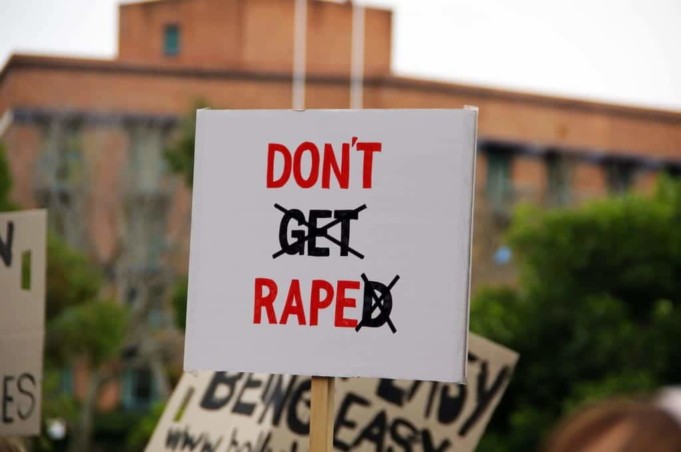Have you ever tried to imagine what rape victims go through afterwards? If yes, then you may need to know about Rape Trauma Disorder. Rape or sexual assault is a serious crime.
It is when a person has sexual intercourse with another without his or her consent. Rape trauma disorder is defined as a group of mental, emotional, and physical that most rape victims go through after a rape incident of sexual assault.
Rape trauma disorder can occur and persist for months or years, and may even leave scars for a lifetime. The world has come to accept that women are mostly victims of rape and men are mostly the perpetrators. However, more awareness of men also being victims of rape too and women, the perpetrators have been created in the last decade.
There are also cases of men being assaulted by men, women being assaulted by women, children, and infants being assaulted by older individuals and older individuals being raped by younger persons.
This is to say that rape can happen to anyone and the only cause of rape is the rapist. Rape trauma may result in the following:
Psychological Changes as a result of rape trauma disorder
Many rape survivors suffer from rape trauma disorder, which can be compared to Post Traumatic Stress Disorder (PTSD) after the incident. This may include strong emotions of fear, guilt, anxiety, depression, anger, shame, guilt, and sadness.
The stigma that accompanies rape may contribute to the shame the victims may feel. This is according to the environment the victim finds themselves. There are societies that victim shame female victims of rape and shame male survivors for getting raped.
These feelings tend to subside over time for some survivors; but then, others may not recover easily and the psychological distress will persist for months or even years.
Physical Health Problems
A number of rape survivors especially females may experience some chronic physical conditions such as pelvic pain, digestive conditions, non-epileptic seizures, more intense premenstrual symptoms, reproductive health problems, low sec drive, and arthritis.
This may be a result of the Post Traumatic Stress Disorder, the victim may be going through because PTSD and rape trauma disorder is believed to be linked to the development of some physical health conditions.
Unhealthy Behaviors
Rape survivors oftentimes adopt unhealthy behaviours such as having many sexual partners without protection, avoidance behaviour, self-injury, and alcohol and substance abuse, all in the bid to cope with the psychological trauma of rape.
Phobias
Subconsciously, victims of rape tend to develop phobias, and the common phobias they develop are as follows:
- Fear of crowds
- Fear of being alone
- Fear of men or women
- Fear of places
- Fear of being touched
- Fear of strangers
They also develop certain fears pertaining to certain characteristics of the assaulter or the place of the assault, such as hair colour, smell, type of clothing, type of car, etc.
Some victims may become paranoid and may feel a pervasive fear of other people.
Stages of rape trauma disorder
Rape trauma disorder is made up of five identified stages of mental and emotional trauma that rape survivors pass through and they are namely:
- The acute stage
- The outer adjustment stage
- The underground stage
- The reorganization stage
- The renormalization stage.
Acute stage
This stage happens days after the rape incident. In some people, it occurs weeks after the abuse. When this stage may occur and last is disproportionate and may vary across individuals.
Immediate symptoms occur and may persist for a couple of days to a few more weeks. However, these symptoms may persist into the outward adjustment stage.
Studies suggest that rape victims react differently to their respective unpleasant rape incidents. However, the response of rape victims has been categorized into the following:
- Expressed: This is characterized by hysteria, agitation, crying spells, and anxiety attacks.
- Controlled: The victim may seem calm and appear as nothing happened.
- Shock or disbelief: The victim is visibly shaken by the event and is highly disoriented. This is also characterized by a lack of focus, apathy, poor memory, confusion, and difficulty in handling their daily tasks.
Victims fall into one of the aforementioned categories but not all of them express their emotions outwardly. Some may seem unagitated and unaffected by the violation.
Symptoms of the acute stage
The following are the immediate symptoms victims at this stage may experience :
- Lessened vigilance
- Apathy
- Sensory and affective numbness
- Dulled memory functions.
- Disorganized thought content.
- Vomiting
- Paralyzing anxiety.
- Pronounced internal tremor.
- An obsession to wash or clean themselves.
- Hysteria
- Confusion
- Intense sensitivity to the response from other individuals.
The outward adjustment stage
At this stage of rape trauma disorder, victims of rape push through with their life because they need life to go on. Their careers, businesses, education, family, and other relationships must go on even if it means dragging themselves with it.
At this stage, they may still be suffering emotional tumult but they apply many coping mechanisms to help them pull through while pushing their lives with it.
Some of them make the mistake of applying maladaptive strategies such as alcohol and substance abuse, unhealthy lifestyles, violence, ruining some of their relationships because they feel they need space, etc.
Underground stage
This is the stage where rape survivors try to go back to living their lives as nothing happened. They rather not talk, think, or remember the incident. They generally avoid anything that will remind them of the incident or even make them talk about it.
To the victims, they are over the incident but they down they know that they are having difficulty in focusing on things especially things that they used to do effortlessly or they enjoying doing even despite the stress that comes with the tasks.
They also suffer from depression and disassociation, yet they act as if they are fine, sometimes they try a little too hard for instance; they go out shopping, drinking, and party hard or even harder.
All this is to forget the unpleasant incident or to convince themselves that they are okay and have moved on.
Reorganization stage
At this stage, many rape survivors tend to plummet back into emotional tumult where they are highly prone to develop fears and phobias, appetite perturbation like nausea and vomiting, eating disorder such as anorexia nervosa and/or binge-eating syndrome, and night terrors and nightmares with repeated fantasies of violently taking revenge on the perpetrator of the crime.
The renormalization stage
At this stage of rape trauma disorder, the victims incorporate the rape incident into their lives by accepting the fact that what they had gone through was real, it had happened and it is all in the past.
This is the stage where they convince themselves that they cannot change the past and so they have to move on with their lives.
At this stage, they successfully put out the feeling of shame, guilt, and disgust and actually move on with their lives. However, some people do not make it to this stage.
Treating Rape Trauma Disorder
Rape survivors know personally that the real war is after the war. Rape has many effects on its victims, they may include the physical injuries and the immediate sense of guilt and abuse sustained by the victims.
However, there are victims that time heals their pains and recover from the psychological effects they had experienced. Unfortunately, there are some victims whose pains are worsened as time passes, and these individuals may go through their lives feeling awful and this can literally ruin their lives.
Fortunately, Treatments are available for victims of rape to help them successfully recover from rape trauma disorder.
The treatments are;
- Exposure therapy
- Cognitive-processing therapy
- Medications
Coping strategies for rape victims
These strategies will help you cope with rape trauma
- First and foremost, you have to accept the fact that the rape incident happened and it is all in the past.
- You have to acknowledge that it was never your fault to get raped. This only cause of rape is the rapist.
- Engage in what you enjoy doing to occasionally take your mind off the incident while making yourself happy.
- Talk about the incident by confiding in a friend.
- Consult a therapist to get professional help.
We hope that this article has been helpful. Kindly share your thoughts with us in the comments section below.












